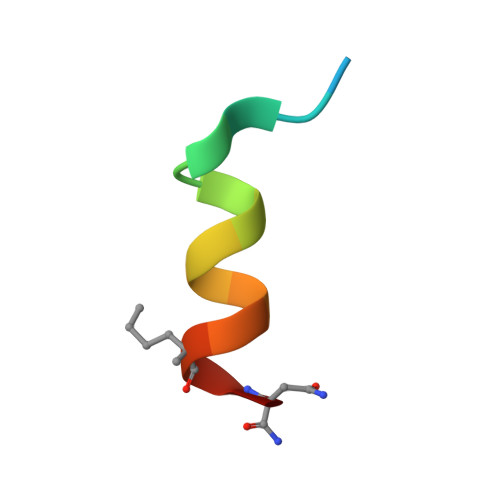Identification of a Structural Determinant for Selective Targeting of HDMX.
Ben-Nun, Y., Seo, H.S., Harvey, E.P., Hauseman, Z.J., Wales, T.E., Newman, C.E., Cathcart, A.M., Engen, J.R., Dhe-Paganon, S., Walensky, L.D.(2020) Structure 28: 847-857.e5
- PubMed: 32359398
- DOI: https://doi.org/10.1016/j.str.2020.04.011
- Primary Citation of Related Structures:
6V4E, 6V4F, 6V4G, 6V4H - PubMed Abstract:
p53 is a critical tumor-suppressor protein that guards the human genome against mutations by inducing cell-cycle arrest or apoptosis. Cancer cells subvert p53 by deletion, mutation, or overexpression of the negative regulators HDM2 and HDMX. For tumors that retain wild-type p53, its reactivation by pharmacologic targeting of HDM2 and/or HDMX represents a promising strategy, with a series of selective small-molecule HDM2 inhibitors and a dual HDM2/HDMX stapled-peptide inhibitor being evaluated in clinical trials. Because selective HDM2 targeting can cause hematologic toxicity, selective HDMX inhibitors could provide an alternative p53-reactivation strategy, but clinical candidates remain elusive. Here, we applied a mutation-scanning approach to uncover p53-based stapled peptides that are selective for HDMX. Crystal structures of stapled-peptide/HDMX complexes revealed a molecular mechanism for the observed specificity, which was validated by HDMX mutagenesis. Thus, we provide a blueprint for the development of HDMX-selective inhibitors to dissect and target the p53/HDMX interaction.
- Department of Pediatric Oncology, Dana-Farber Cancer Institute, 450 Brookline Avenue, Boston, MA 02215, USA; Linde Program in Cancer Chemical Biology, Dana-Farber Cancer Institute, Boston, MA 02215, USA.
Organizational Affiliation:


















